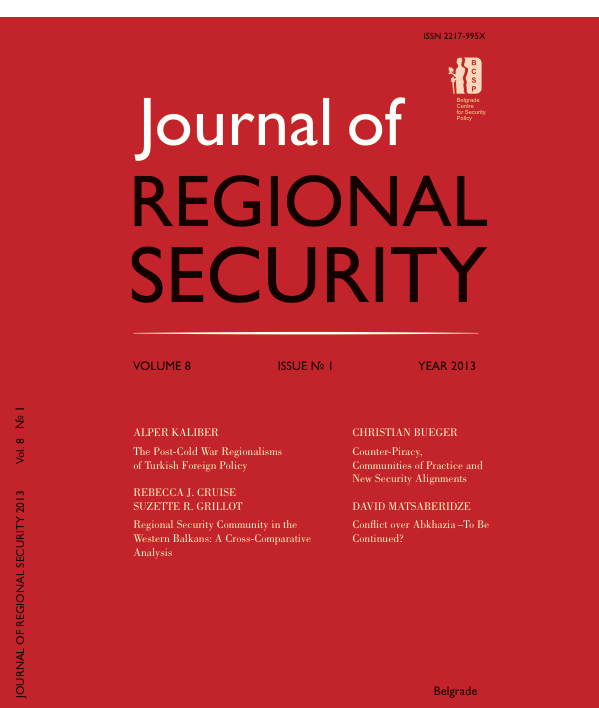Regional Security Community in the Western Balkans: A Cross-Comparative Analysis
Abstract
Many have observed the early phases of regional security community development in the Western Balkans over the past decade. Much of this research has focuses on elite-level, government to government and government to International Organization cooperation. Yet, for security community to become a reality, it must also develop at the public-level. In the Western Balkans, it remains to be seen just how deep this new sense of community reaches. Based on fieldwork and surveys conducted in 2007 and 2008, a crucial moment for the region, we argue that public-level security community is inconsistent and in some areas is all together lacking. It is our position that programs advanced in the Western Balkans must concentrate not just on elite institution building, but also on community building within and between the individual countries of the region.
References
Adler, Emanuel. 1991. “Cognitive Evolution: A Dynamic Approach for the Study of International Relations and Their Progress,” In Progress in Postwar International Relations, edited by Emanuel Adler and Beverly Crawford, 291–92. New York: Columbia University Press.
Adler, Emanuel. 1992. “Europe’s New Security Order: A Pluralistic Security Community,” In The Future of European Security, edited by Beverly Crawford, 287−326. Berkeley: University of California Press.
Adler, Emanuel and Michael Barnett. 1996. “Governing Anarchy: A Research Agenda for the Study of Security Communities,” Ethics and International Affairs 10: 63−98.
Adler, Emanuel and Michael Barnett. 1998. “Security Communities in Theoretical Perspective,” In Security Communities, edited by Emanuel Adler and Michael Barnett, 3−28. Cambridge: Cambridge University Press.
Adler, Emanuel and Michael Barnett. 1998. “A Framework for the Study of Security Communities,” In Security Communities, edited by Emanuel Adler and Michael Barnett, 29–65. Cambridge: Cambridge University Press.
Belloni, Roberto. 2009. “European Integration and the Western Balkans: Lessons, Prospects and Obstacles,” Journal of Balkan and Near Eastern Studies 11 (3): 313– 331.
Bechev, Dimitar. 2006. “Carrots, Sticks and Norms: the EU and Regional Cooperation in Southeastern Europe,” Journal of Southern Europe and the Balkans 8 (1): 27–43.
Bechev, Dimitar. 2011. Constructing South East Europe: The Politics of Balkan Regional Cooperation. Houndmills Basingstoke: Palgrave Macmillan.
Bieber, Florian. 2012. “The Western Balkans are Dead − Long Live the Balkans!” In Unfinished Business − The Western Balkans and the International Community, edited by Verdran Dzihic and Daniel Hamilton. Washington DC: Brookings Institution.
Deutsch, Karl. 1957. Political Community and the North Atlantic Area. Princeton: Princeton University Press.
Deutsch, Karl W. 1964. “Communication Theory and Political Integration,” In The Integration of Political Communities, edited by Philip E. Jacob and James V. Toscano, 46−74. Philadelphia: J.B. Lippincott Company.
Grillot, Suzette R., Rebecca J. Cruise and Valerie J. D’Erman. 2010. “Developing Security Community in the Western Balkans: The Role of the EU and NATO,” International Politics 47 (1): 62–90.
Kavalski, Emilian. 2006. “From the Western Balkans to the Greater Balkans Area: The External Conditioning of ‘Awkward’ and ‘Integrated’ States,” Mediterranean Quarterly 17 (3): 86−100.
Kavalski, Emilian. 2008. Extending the European Security Community: Constructing Peace in the Balkans. New York: Tauris Academic Studies.
Europa.com 2011.
“Kosovo Question Still Divides EU,” 2012. Deutsche Welle. http://www.dw.de/dw/
article/0,,16226802,00.html
Mameli, Simona. 2011. “Regional Cooperation in the Western Balkans in Times of Political and Economic Uncertainty,” Portal on Central Eastern and Balkan Europe. #8. www.pecob.edu
“Montenegro Chooses Independence,” 2006. BBC. http://news.bbc.co.uk/2/hi/ europe/5003220.stm
Simic, Predrag. 2011. “Euro-Atlanticism and the Creation of a Security Community’ in the Balkans.” Transconflict. http://www.transconflict.com/2011/07/ euroatlanticism-and-creation-of-security-community-balkans-117/
UNEP. 2011. http://www.worldlakes.org/lakedetails.asp?lakeid=8770
Rozoff, Rick. 2009. “Adriatic Charter and the Balkans: Smaller Nations, Larger NATO,” Global Research. http://www.globalresearch.ca/adriatic-charter-and-the- balkans-smaller-nations-larger-nato/
Wendt, Alexander. 1992. “Anarchy is What States Make of It,” International Organization 46 (2): 395–421.
Authors retain copyright of the published papers and grant to the publisher the non-exclusive right to publish the article, to be cited as its original publisher in case of reuse, and to distribute it in all forms and media.
The published articles will be distributed under the Creative Commons Attribution 4.0 International License (CC BY). It is allowed to copy and redistribute the material in any medium or format, and remix, transform, and build upon it for any purpose, even commercially, as long as appropriate credit is given to the original author(s), a link to the license is provided and it is indicated if changes were made. / The published articles will be distributed under the Creative Commons Attribution ShareAlike 4.0 International license (CC BY-SA). It is allowed to copy and redistribute the material in any medium or format, and remix, transform, and build upon it for any purpose, even commercially, as long as appropriate credit is given to the original author(s), a link to the license is provided, it is indicated if changes were made and the new work is distributed under the same license as the original.
Users are required to provide full bibliographic description of the original publication (authors, article title, journal title, volume, issue, pages), as well as its DOI code. In electronic publishing, users are also required to link the content with both the original article published in Journal of Regional Security and the licence used.
Authors are able to enter into separate, additional contractual arrangements for the non-exclusive distribution of the journal's published version of the work (e.g., post it to an institutional repository or publish it in a book), with an acknowledgement of its initial publication in this journal.
Authors are permitted to deposit author’s pre-print / author’s post-print (accepted version) / publisher's version (PDF) of their work in an institutional repository, subject-based repository, author's personal website (including social networking sites, such as ResearchGate, Academia.edu, etc.), and/or departmental website prior or during the submission process / at any time after the acceptance of the manuscript / at any time after publication.
Full bibliographic information (authors, article title, journal title, volume, issue, pages) about the original publication must be provided and links must be made to the article's DOI and the license.

